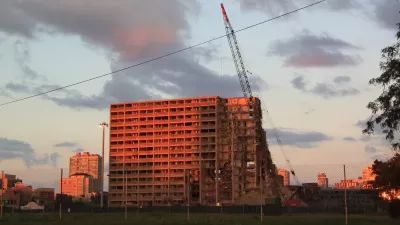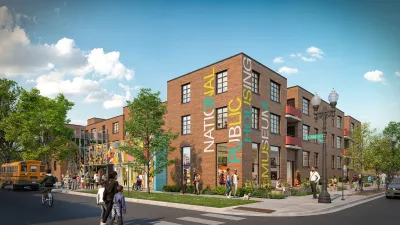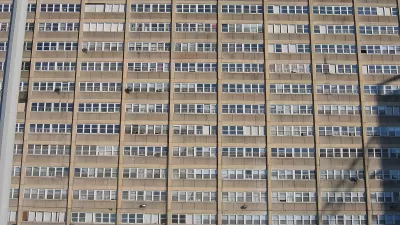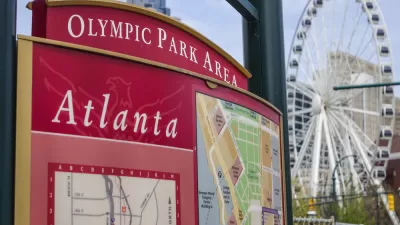A new book tells the story of Chicago's Cabrini-Green and reflects on what the lives of the people in this public housing project have to say about the lives of all Americans.

The last of Cabrini-Green's high-rise buildings was demolished in 2011, but the housing project's impact continues to be felt. High-Risers: Cabrini-Green and the Fate of American Public Housing, by Ben Austen, tells the story of Cabrini-Green in an immediate way. "By placing the stories of people at the forefront of the narrative, Austen invites us to bear witness history, not a lecture. He narrates how parents fought to improve conditions at overcrowded Jenner Elementary; how residents lobbied an unresponsive CHA to fix broken elevators and replace lights; and when Hubert started a drum and bugle corps called the Corsairs that practiced on the fields adjacent to the high-rises," Przybyl writes for South Side Weekly.
Austen's book tells the story of how policy and population changes in the city changed the building and how the project that stood close to the homes of the wealthy became increasingly isolated from its neighbors. "But as time went on, these requirements changed and demographic shifts—including Chicago’s declining population—influenced who was able and willing to live at Cabrini," Przybyl writes.
Pryzbyl shares one particularly affecting story from the book: "On the first day of school, Kelvin couldn’t stop crying in front of the white teacher—'Although Kelvin had sprinted past countless white people on the streets of the Near North Side, he’d never before exchanged two consecutive sentences with one.'"
FULL STORY: The Personal Histories of Public Housing

Planetizen Federal Action Tracker
A weekly monitor of how Trump’s orders and actions are impacting planners and planning in America.

Congressman Proposes Bill to Rename DC Metro “Trump Train”
The Make Autorail Great Again Act would withhold federal funding to the system until the Washington Metropolitan Area Transit Authority (WMATA), rebrands as the Washington Metropolitan Authority for Greater Access (WMAGA).

The Simple Legislative Tool Transforming Vacant Downtowns
In California, Michigan and Georgia, an easy win is bringing dollars — and delight — back to city centers.

The States Losing Rural Delivery Rooms at an Alarming Pace
In some states, as few as 9% of rural hospitals still deliver babies. As a result, rising pre-term births, no adequate pre-term care and "harrowing" close calls are a growing reality.

The Small South Asian Republic Going all in on EVs
Thanks to one simple policy change less than five years ago, 65% of new cars in this Himalayan country are now electric.

DC Backpedals on Bike Lane Protection, Swaps Barriers for Paint
Citing aesthetic concerns, the city is removing the concrete barriers and flexposts that once separated Arizona Avenue cyclists from motor vehicles.
Urban Design for Planners 1: Software Tools
This six-course series explores essential urban design concepts using open source software and equips planners with the tools they need to participate fully in the urban design process.
Planning for Universal Design
Learn the tools for implementing Universal Design in planning regulations.
Smith Gee Studio
City of Charlotte
City of Camden Redevelopment Agency
City of Astoria
Transportation Research & Education Center (TREC) at Portland State University
US High Speed Rail Association
City of Camden Redevelopment Agency
Municipality of Princeton (NJ)





























